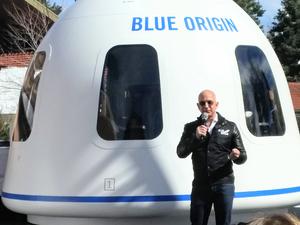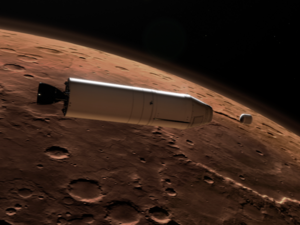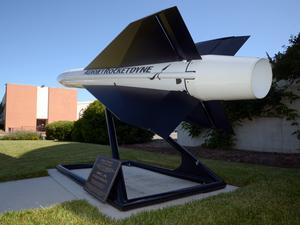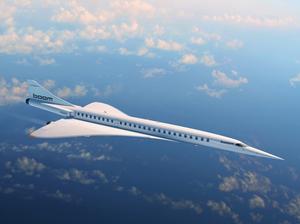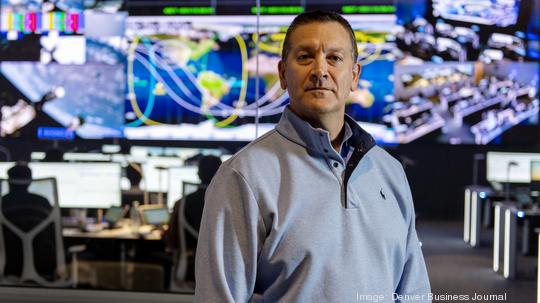
A Denver-area space company that employs about 1,000 people is doubling its staff, hiring hundreds over the next year, opening a second local campus and starting a space-launch operation in Florida.
Sierra Space, which builds the Dream Chaser space plane in Louisville, Kentucky, leased space in Centennial, Colorado, and plans to add a staff of about 450 there as it also hires at its north metro-area Denver locations.
The company is staffing up to regularly launch Dream Chasers while also developing its Orbital Reef space station with partner company Blue Origin, founded by billionaire Jeff Bezos. The companies bill the station as a “mixed-use business park” for research and commercial activity in orbit 250 miles above the Earth, launching in 2027.
Sierra Space’s expansion is about more than just those two projects — the aim is to create a business that provides transportation and orbiting destinations and serves as a platform for establishing commercial activity in space, said CEO Tom Vice, in an exclusive interview with the Denver Business Journal.
“We are embarking on building one of the most iconic brands in the world,” he said.
“Our long-term vision is to enable humanity to build civilizations beyond Earth,” Vice said, likening the company to a commercial real estate developer in low-Earth orbit. “We think the way to do that, first, is to develop a platform in orbit that benefits life on Earth.”
The privately held company aims to expand its Denver-area headcount over the next year by about 700 positions, adding them at the new Centennial location and existing facilities in the northwest suburbs, which it plans to grow.
Beyond that, the company is looking at adding more office space to house hundreds of more employees near Louisville or Broomfield, Colorado, to expand further, establishing a solar panel production center building systems to handle the power needs of spacecraft the company plans to put in orbit, Vice said.
The company will also be growing in Madison, where the business has its propulsion and rocket engine development center, Vice said. A fourth company site, in Durham, North Carolina, is also being opened this year, Sierra Space says.
Sierra Space did not disclose the number of new positions being added in Madison. As of Monday, the company has 31 job openings for its Madison office on its career page, though it's unclear how many are related to the current expansion. Twenty-eight of the jobs were posted within the past 28 days.
Sierra Space chose to open a Centennial campus because hiring has grown so competitive in the booming Colorado space industry that Sierra Space didn’t want to lose out on recruiting talented employees who may not want to commute across the metro area.
“We want to make sure to maximize our access to talent, and there’s amazing talent around Denver and Centennial in this industry especially,” Vice said.
At the same time, Sierra Space plans to add a spacecraft launch and refurbishing center at NASA’s Kennedy Space Center, on the northern Florida coast, in preparation for regular launches of the Dream Chaser space plane, which NASA has contracted to ferry supplies to the International Space Station. Those cargo missions would be Dream Chaser flights without crew on board.
The Dream Chaser is a space plane that launches atop a rocket carrying it to orbit and then can glide back to landings on a commercial-sized airport runway, either autonomously without crew or flown by a human pilot.
The first launch of the Dream Chaser has been slipping since its original schedule of late 2019, shifting recently to targeting November. Now its first launch is likely in the first quarter of 2023, Vice said.
Getting the company’s six contracted, uncrewed ISS cargo missions for NASA underway will help Sierra Space develop the crew version of Dream Chaser to fly astronauts to low-Earth orbit, he said.
Sierra Space aims to have the crew version take flight in 2025 and be ready to fly astronauts to an Orbital Reef space station two years later.
Sierra Space and Blue Origin have agreed to share development and operations of Orbital Reef stations, pulling in Boeing Co. as a partner to help. The effort landed $130 million in NASA funding helping stoke commercial space stations to complement and then possibly replace the ISS, which is scheduled to be in service until 2030.
There’s the possibility of regular flights to two space stations — Orbital Reef and the ISS — in the final years of the decade, Vice said.
Sierra Space is preparing to have as many as 100 Dream Chaser launches annually by 2030, he said.
The spacecraft operations center it’s establishing at Kennedy Space Center is aimed to process Dream Chasers and ready them for flight and do maintenance on spacecraft that have returned from orbit.
Perfecting Dream Chaser operations and bringing the spacecraft’s costs down will complement development of space stations in partnership with Blue Origin, Vice said.
“It’s bigger than just Dream Chaser, but Dream Chaser is the central actor in this vision we see playing out,” he said. Sierra Space is naming its Florida location Earth Base 1 with the expectation the company will open similar bases elsewhere, possibly in other countries, to handle Dream Chaser launches and operations.
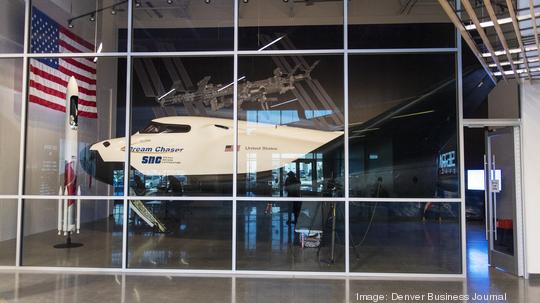
Sierra Space’s business isn’t limited to serving government space programs or focused on providing tourist trips to space for the wealthy, he said. The vertical integration of Sierra Space shows the company’s building an organization capable of providing a range of activities in orbit, a platform he predicts that will draw partnerships with pharmaceutical companies, semiconductor makers and computer server farms looking for the benefits of ample energy and zero-gravity environments.
He envisions there being condominium units or embassies on Sierra Space stations and of having 3-D printers in orbit capable of making expandable habitats for future space stations that would be too big to launch from Earth.That broad, ambitious vision requiring collaboration and innovative thinking will appeal to the kind of talented workforce Sierra Space hopes to hire, Vice said.
“You want to be part of something that alters the course of humanity as an engineer,” he said. “This is not just building another satellite system; it’s not about building just another launch vehicle. It’s about doing something that’s really going to change the world in the long run.”
Sierra Space is funding its burst of staffing expansion with the $1.4 billion round it raised in November from growth equity firms General Atlantic, Coatue and Moore Strategic Ventures and others.
Sierra Space spun off last year to become a wholly-owned subsidiary of its parent company, Sierra Nevada Corp., a privately held Sparks, Nevada-based defense and aerospace contractor. The business’ owners, Fatih and Eren Ozmen, are married billionaires who hired Vice last summer from supersonic jet plane startup Aerion after that business lost funding.
Vice’s background, prior to Aerion, was in running a large division of defense contractor Northrop Grumman (NYSE: NOC). He started his career as an engineer and has been involved in developing stealth bombers, and then managing supply chains and businesses building spacecraft, including the James Webb Space Telescope, and military aircraft.
Vice has been a resident of Florida. His hiring, and recruitment to relocate Sierra Space to other states, Florida or Alabama among them, raised the question of where the company will be headquartered.
Vice, who now also owns a home in foothills above Boulder, considers declaring headquarters for such a distributed company — especially one with international growth aspirations — to be an outdated concept, he said.
The executive talent to run different parts of the business belongs where those work forces are, not in an artificially designated office, he said. The company is committed to having its Colorado offices because it’s where the business can recruit so much of its engineering, science, and space operations talent, he said.
